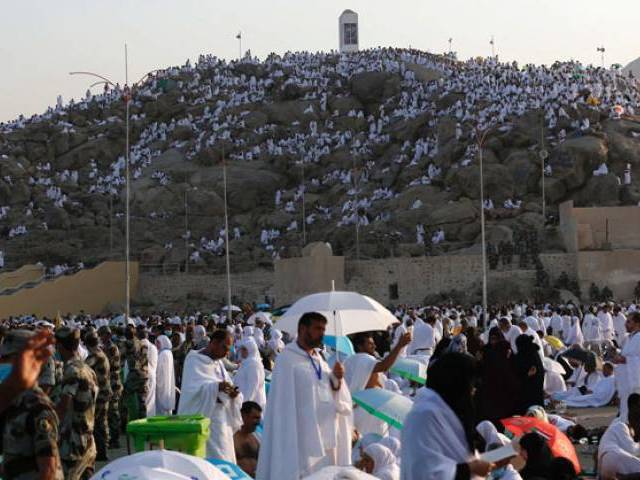
On Thursday, the 2017 hajj pilgrimage climaxed with the gathering of over three million Muslims from more than 200 countries including Nigeria at the plain of Arafat, East of Makkah for the very essential rite in the annual spiritual exercise.
Mount Arafat is about 15 kilometers from Makkah. Because of the exigency of time and importance of this rite, some countries including Nigeria had moved to Mina, a tented suburb, 48 hours before the event. It is the practice of the Prophet to stop over at Mina till dawn before moving to the Mount Arafah. Clad in two unstitched pieces of white fabric for men known as Ihram and any loose-fitting clothing for women, the pilgrims chanted the talbiya, to the hillside, filling all the environment where Prophet Muhammad (s.a.w) gave his last sermon.
Nothing could be heard other than the talbiya, calling on Allah, praising Him and supplicating to Him in a millieu of brotherhood and friendship. In an extremely sombre mood, and in introspection of their life activities as well as imagination of the Prophet’s last message on the 70-meter hill about 1438 years ago, tears flowed freely as others in solemn supplication cried to Allah for forgiveness of sins and better things in life.
To Muslims, the day is a special favour from Allah. It is believed that the Day of Arafat is the best day of the year just like Allah made the Night of Qadr the best night of the year. It is a when prayers are answered, when Muslims improve in their relationship with Him by way of doing all kinds of good deeds and dua.
According to a Hadith: The best of dua is dua on the day of Arafat.(Hasan Al-Albaani in Saheeh Al-Jaamif1102).
As at press time, the pilgrims were moving to Muzdalifah, about nine kilometers away, where they observed the night prayers and passed the night, under the open sky and without any class distinction. No VIP. This enacts the consciousness of the day of judgment, where everybody is equal to the other.
There, pilgrims will pick stones as small as grains of maize and head towards Jamarat for the symbolic stoning of the devil. Overtime, the stoning has been misconstrued by non-believers, but without being apologetic; suffice to say it being done basically for the renunciation of the devil, the accursed. At sunrise, (today) when Eid-Adha is being celebrated at home (other parts of the world) and rams being slaughtered, pilgrims will cast their stones at the devil.
As part of the intensified crowed control mechanism, the Saudi government has scheduled different times for stoning at the Jamarat for different countries. Nigeria will be observing their stoning today, Friday. Specifically, Lagos with 2,332 pilgrims will observe theirs by 11am today. The stoning ritual will continue for another two days before pilgrims will move to Kaaba for Tawaf, Safaa and Marwa rites.
Also at the Kaaba where Pilgrims will later complete their rites with the circumbulation of the Kaaba as well as the Safaa and Marwa rites, wide expansion had been done with cameras installed at strategic points to forestall congestion and stampede. The government had also appealed to pilgrims to perform their rites at different times of the day or night.
Blessed day of Arafat
The day of Arafat is among the most blessed times of the year in Islam. It commemorates the finality of revelation (Qur’an 5:3) and the completion of the Hajj pilgrimage. It is also the day when the Prophet delivered his last sermon. It is the day on which the religion was perfected and Allah’s favour was completed.
It is the day on which Allah took the covenant from the progeny of Adam; it is the day of forgiveness of sins, freedom from the Fire and pride in the people who are there: fasting on this day is expiation for two years for those who are not on Hajj, so everyone is blessed.
In Saheeh Muslim it was narrated from Aafishah (may Allah be pleased with her) that the Prophet (peace and blessings of Allaah be upon him) said: There is no day on which Allah frees more people from the Fire than the Day of Arafaah. He comes close and expresses His pride to the angels, saying, What do these people want?
It was reported from Ibn Umar that the Prophet (peace and blessings of Allah be upon him) said: Allaah expresses His pride to His angels at the time of Ishaa on the Day of Arafaah, about the people of Arafaah. He says: Look at My slaves who have come unkempt and dusty. Narrated by Ahmad and classed as saheeh by al-Albaani.
This story first appeared on Vanguard on September 1, 2017.









